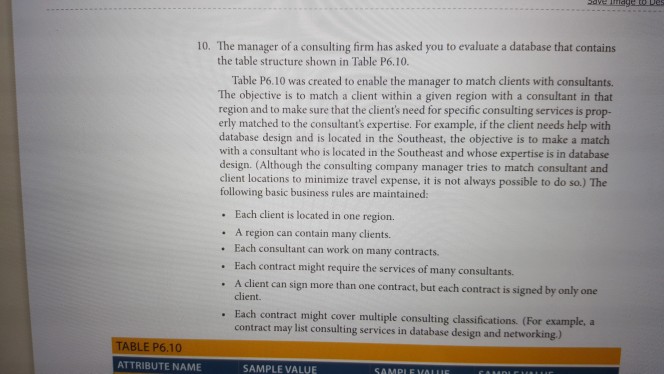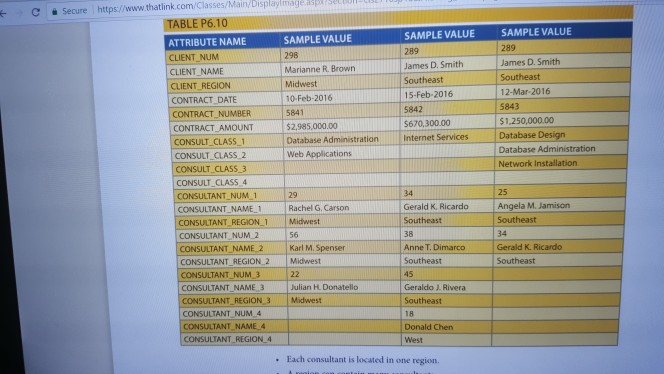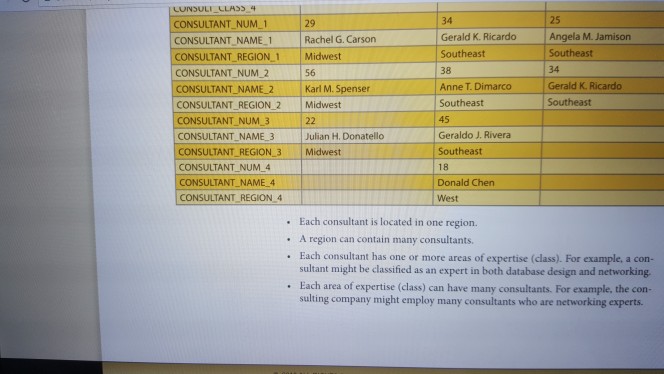Question
Part III: Complete an entity relationship diagram in 3NF for problem #10 on pages 242-244 in our text (12th edition). Your database should work for
Part III: Complete an entity relationship diagram in 3NF for problem #10 on pages 242-244 in our text (12th edition). Your database should work for any number of consultants, not just the four listed. Use both the data in the tables as well as the description of the problems. Complete only the ERD, not the other requirements (descriptions, business rules, etc.).
Notes Your database should be a generic database that will work for new data going forward, not just the example data that is in the figure. Use your understanding of the world to make decisions. Assume the most typical case.Note that for the problems from our text the author chose to draw the rows as columns and columns as rows.Follow the rules that we learned in class, including but not limited to:Use dash or solid lines for weak and strong entities.We can no longer use many-to-many relationships or ternary relationships.Include connectivities (tick marks and circles)Include verbs on relationships only when there is more than one relationship between the same two entities.You must use Visio to draw your diagrams.
Formatting Notes Do not include to much extra verbiage around your problem. This includes things like notes, the problem itself, or long explanations of the choice you made. If you do include extras make sure you use formatting to make it easy for me to find your answer.Be sure to minimize the number of times that relationship lines cross each other. This makes the diagram difficult to read. With diagrams with ten or less entities it is generally possible to rearrange the diagram so that no lines cross.Each diagram should be complete. Do not include any this line continues on the other diagram references.To give yourself more space you can decrease the margins in MS Word to 1/4".Your homework should be submitted as a single MS Word document. Use the snipping tool in MS Windows to create an image of your Visio diagram to paste into your MS Word document.Don't forget to mark your primary keys and foreign keys in Visio with the PK and FK icons.



10. The manager of a consulting firm has asked you to evaluate a database that contains the table structure shown in Table P6.10. Table P6.10 was created to enable the manager to match clients with consultants. The objective is to match a client within a given region with a consultant in that region and to make sure that the client's need for specific consulting services is prop- erly matched to the consultant's expertise. For example, if the client needs help with database design and is located in the Southeast, the objective is to make a match with a consultant who is located in the Southeast and whose expertise is in database design. (Although the consulting company manager tries to match consultant and client locations to minimize travel expense, it is not always possible to do so.) The following basic business rules are maintained: . Each client is located in one region. . A region can contain many clients. Each consultant can work on many contracts. . Each contract might require the services of many consultants. . A client can sign more than one contract, but each contract is signed by only one client. Each contract might cover multiple consulting classifications. (For example, a contract may list consulting services in database design and networking) . TABLE P6.10 ATTRIBUTE NAME SAMPLE VALUE 10. The manager of a consulting firm has asked you to evaluate a database that contains the table structure shown in Table P6.10. Table P6.10 was created to enable the manager to match clients with consultants. The objective is to match a client within a given region with a consultant in that region and to make sure that the client's need for specific consulting services is prop- erly matched to the consultant's expertise. For example, if the client needs help with database design and is located in the Southeast, the objective is to make a match with a consultant who is located in the Southeast and whose expertise is in database design. (Although the consulting company manager tries to match consultant and client locations to minimize travel expense, it is not always possible to do so.) The following basic business rules are maintained: . Each client is located in one region. . A region can contain many clients. Each consultant can work on many contracts. . Each contract might require the services of many consultants. . A client can sign more than one contract, but each contract is signed by only one client. Each contract might cover multiple consulting classifications. (For example, a contract may list consulting services in database design and networking) . TABLE P6.10 ATTRIBUTE NAME SAMPLE VALUE
Step by Step Solution
There are 3 Steps involved in it
Step: 1

Get Instant Access to Expert-Tailored Solutions
See step-by-step solutions with expert insights and AI powered tools for academic success
Step: 2

Step: 3

Ace Your Homework with AI
Get the answers you need in no time with our AI-driven, step-by-step assistance
Get Started


